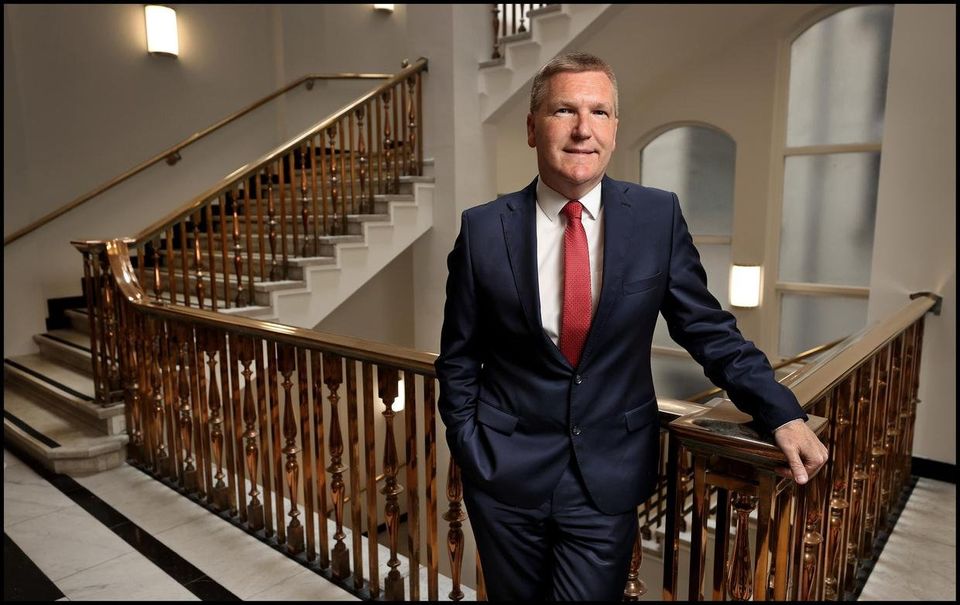Pay rises in an unreformed public sector will destroy the social contract
Comment
Marc Coleman. Photo: Gerard McCarthy
The issue of raising the pay of top level public sector workers, and whether or not we can afford it, has occupied a considerable amount of column inches recently.
I am a former public servant and have the pleasure and privilege of working regularly with public servants and know of their dedication and commitment and how it can be insufficiently rewarded and unrecognised.
Teachers, airport staff and nurses are also facing similar challenges to those on lower pay in the private sector in terms of the cost-of-living and housing crises. It is vital to say this because, if not handled sensitively, the coming impact of inflation and the Government’s response to it could be deeply socially and politically divisive.
In reality though, deep economic and political divisions exist between a powerful unionised public sector that can bargain and an indigenous private sector that largely cannot.
As my April 2020 book An Economic Response to Covid-19 explained, the private sector is itself divided between a powerful multinational sector – including institutional investment funds – that has the ear of government and a far more vulnerable indigenous sector that struggles to be heard.
That book analysed how in the previous global financial crisis, the latter sector suffered a more prolonged U-shaped recession compared to rapid recovery in the multinational sector and relative stability of the public sector.
Months before, the Government had organised – only to abandon – an event exploring what was then already a small business funding crisis. Among 13 speakers, just one representative was scheduled to represent small business.
Back then I was fearful that a lack of balance in policy discussion would produce the wrong response to Covid-19. While thankfully that balance was partly redressed, it has returned in the debate about inflation in which private sector taxpayer and SME voices are largely absent.
Inflation is no walk in the park for anyone. But headline public pay is, on average, one-third higher than private sector levels, according to published headline figures. As the redoubtable Mick Lynch – general secretary of the UK Rail, Maritime and Transport union, which is currently involved in a major national industrial dispute there – said, there are public sector workers enduring real hardship.
If not handled sensitively, the coming impact of inflation and the Government’s response to it could be deeply socially and politically divisive. Pictured, Public Expenditure and Reform Minister Michael McGrath
But compared to private sector workers, often on low incomes, they have secure jobs and pensions.
Some argue that pay differences between the sectors are in reality much lower, and use factors such as higher qualifications, longer duration of service, larger size of public service organisations and the pension levy to justify their measures.
But as we have seen from the HSE, higher qualifications are no guarantee of performance.
Also larger organisational sizes and longer duration of employment size reflect relatively higher job security and immunity from downsizing compared to the private sector.
So citing these as factors is arguably invalid (if not rubbing salt in taxpayer wounds). And while resented, the pension levy is a fraction of what a private sector worker would – if he/she could afford it – have to pay to obtain a public service pension.
In reality, the private-public pay gap is real, substantial and arises not from justified factors but also from stronger political and lobbying power.
In An Economic Response to Covid-19 I explained how that imbalance has skewed fiscal policy.
Compared to a broadly balanced “austerity” from 2008 and 2014, when roughly €12bn each was taken in tax hikes and spending “restraint”, (“restraint” because spending actually rose in that period) fiscal policy during the 2015 and 2019 recovery was hugely biased against taxpayers.
Spending rose by €16bn a year between 2015 and 2019, but net tax cuts were a mere €0.7bn. That failure to restore private sector after-tax pay to pre-2008 levels is a key cause of a cost-of-living crisis that, even before recent inflation, was severe.
The savage cuts in mortgage interest relief, particularly now, leave homeowners brutally and unjustifiably exposed to ECB rate rises that begin in two weeks’ time.
So maybe the question is not whether we can afford public pay rises but whether, if we can, afford a restoration of private sector after-tax incomes to 2008 levels as well?
In answering that question, it is only fair to note that those who dominate the so-called National Economic Dialogue mostly benefit from more taxation and spending, as this shores up their pay and pensions (and its proceedings are reported by the national broadcaster itself seeking more State funding).
Politicians and civil servants’ pay and pensions are tied to each other and research institutes like the ESRI and universities benefit from State subvention of generous pay and pensions. In addition, top-level recruitment in the public sector seems to lack diversity from a private sector point of view, with data from the Institute of Public Administration suggesting that fewer than 10pc of such roles are filled from outside the public sector.
Speaking of pensions, in 2020 an actuarial review calculated that by just eliminating one (very generous) feature of public sector pensions – the fact that they increase as public pay rises – €23bn could be saved over the next 50 years, offsetting the need for the PRSI increase suggested by the Taoiseach. By contrast further pay rises will increase this burden.
In summary – and given the aforementioned dominance of those benefiting from pay rises in setting policy, it is hard to see an already fragile social contract surviving any pay rises that are not accompanied by radical, unprecedented reforms.
Marc Coleman is managing director of Octavian Economics and a former European Central Bank and Department of Finance economist
Join the Irish Independent WhatsApp channel
Stay up to date with all the latest news















